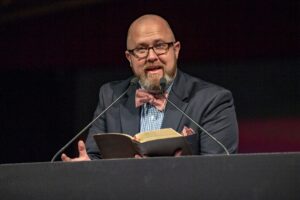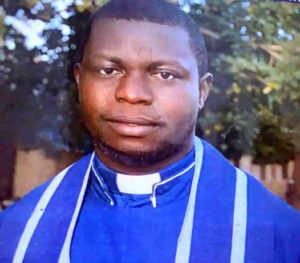
NASHVILLE (BP) — Public apologies by two U.S. megachurches for a lack of compassion in the exercise of church discipline have prompted some Baptist pastors to underscore the need for humility and congregational polity during the attempted restoration of wayward members.
Most American churches have not exercised biblical church discipline for a century, Bart Barber, pastor of First Baptist Church in Farmersville, Texas, told Baptist Press. “Because we have so little practice with it, along the way, as we seek to restore it, people are going to make mistakes. This kind of humility required to apologize for making a mistake, I think, is going to be needed and needed in large quantities in order to be successful in getting to a healthy place with regard to what church membership is.”
Matt Chandler, pastor of the Village Church in Dallas, a Southern Baptist multisite congregation, apologized during worship services May 30-31 for a domineering approach by elders in some church discipline cases, the church confirmed to BP.
Christianity Today reported on one case in which the church’s leaders initiated the discipline process when a woman ended her marriage after discovering her husband had viewed child pornography for years. She requested to be removed from membership, but the request was denied initially, CT reported, with leaders citing a membership covenant requiring couples to “walk through the steps of marriage reconciliation” before pursuing divorce and a policy forbidding members under discipline from withdrawing.
The Village Church’s elders reversed their course May 28 and released her from membership, issuing an apology for not leading her “to a place conducive to peace, repentance and healing.” She filed for a marriage annulment under Texas law.
In Chicago, a megachurch’s pastor and elders apologized last fall for “the complete lack of biblically required restorative component” in the discipline of three former elders accused of stirring up division in the church, CT reported. In September, Pastor James MacDonald said Harvest Bible Chapel’s elder board had “lifted all discipline” from the former elders.
The former elders accused Harvest’s leaders of fostering a “culture of intimidation” and exhibiting a lack of transparency. In response, a 2013 video message from Harvest’s leadership called church members to “avoid these former Harvest elders at all costs lest you incur great detriment to your own soul.” The former elders’ viewpoints, according to the video, were “satanic to the core,” CT reported.
Neither the Village Church nor Harvest brings matters of church discipline to a congregational vote.
One way churches err in their discipline processes is by failing to include the entire congregation in votes to withdraw fellowship from individuals in sin who refuse to repent, said Barber, a former first vice president of the Southern Baptist Convention. The process of church discipline outlined in Matthew 18:15-18, he said, involves confronting a sinning church member individually, then confronting the person again with two or three witnesses if he or she refuses to repent.
If that call to repentance fails, the entire church body should call for repentance and withdraw fellowship from the individual if there is still not a positive response.
“Having that congregational basis to [discipline] is helpful,” Barber said, “because my experience is that congregations are unwilling to extend church discipline sometimes when I’m willing to do it. So there’s something of a mediating force in having to go to an entire congregation.”
Barber, who has led First Baptist to remove a person from church membership, said the primary biblical theme related to church discipline is “rescuing believers who are wandering off into a dangerous position.”
In 2008, Barber sought to help the SBC articulate an official position on church discipline by submitting a resolution on the topic to the convention’s Resolutions Committee. Portions of the draft Barber submitted were incorporated into a resolution adopted by the convention on “regenerate church membership and church member restoration.”
The resolution called churches to repent of “any failure to obey Jesus Christ in the practice of lovingly correcting wayward church members.” It asked “denominational servants to support and encourage churches that seek to recover and implement our Savior’s teaching on church discipline.”
Another pastor to submit a resolution incorporated into that statement was Tom Ascol of Grace Baptist Church in Cape Coral, Fla. He told BP the “biggest mistake” related to corrective church discipline among contemporary churches “is neglecting it altogether.” Among those who do practice it, there can be a tendency of pastors to withdraw fellowship from members without the church’s authority, said Ascol, a member of SBC Executive Committee President Frank S. Page’s Calvinism Advisory Group in 2013-14.
“Pastors can fall into the mistake of exercising pastor discipline, where the church has not been taught [and] the church is not fully on board with what’s supposed to be done,” Ascol said. “… Christ does vest His full authority in the church. So it’s the whole body that has responsibility” for removing individuals from membership.
Most church discipline is “formative” rather than “corrective,” helping believers develop godly character through teaching and encouragement, Ascol said. He added among corrective discipline, most cases do not proceed to the step of involving the entire congregation. Discipline that does progress to congregational involvement should be carried out in love, he said, never with “harshness” or “heavy-handedness.”
Leading Grace to exclude unrepentant individuals from membership is “the most painful thing as a pastor that I’ve ever had to lead a church to do,” Ascol said.
Corrective church discipline “is always for God’s glory. It’s always for the sake of the Gospel,” Ascol said. “… When we administer discipline and we do it right, it’s in love.”














